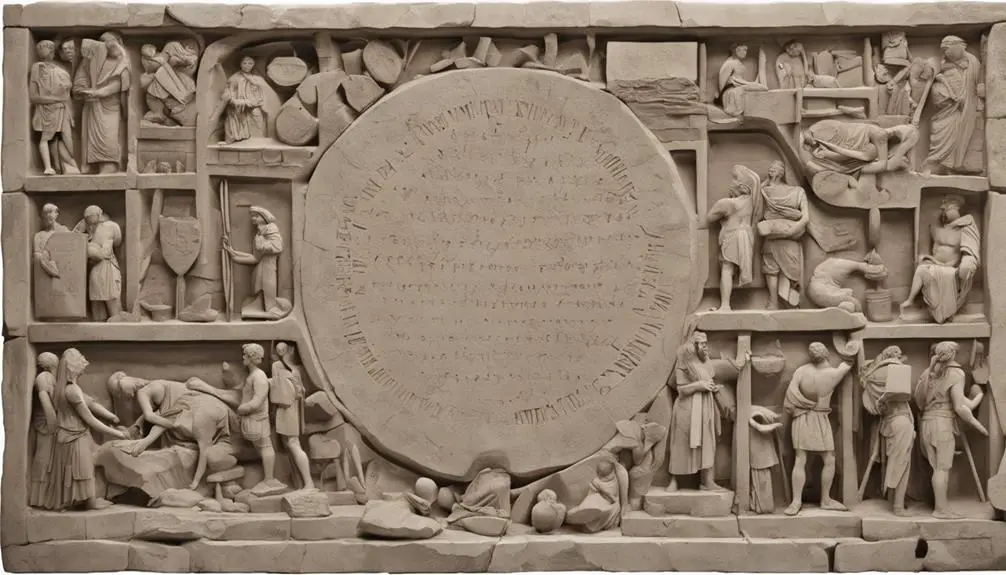Glimpse into the profound interpretations and modern relevance of the Fifth Commandment from the Bible, a journey that promises enlightening surprises.

What Is the Fifth Commandment in the Bible
Have you ever pondered the true meaning behind the Fifth Commandment in the Bible?
It's generally understood as 'Honor your father and your mother,' but interpretations can vary across different denominations and cultures.
You're about to embark on a journey that will shed light on the historical context, various interpretations, and real-life applications of this commandment.
How this biblical mandate translates into modern ethical implications might surprise you.
Will you join the conversation?
Key Takeaways
- The Fifth Commandment emphasizes respect, care, and responsibility towards parents and all relationships.
- It originates from the Torah and Christian Old Testament, with varying interpretations across different religions.
- The commandment poses ethical implications in modern society, particularly around elderly care and intergenerational respect.
- Real-life application of this commandment can be challenging due to cultural complexities, personal dynamics, and the need for moral engagement.
Understanding the Fifth Commandment

Diving into the intricacies of the Fifth Commandment, it's crucial to comprehend its religious significance and ongoing relevance in today's society. This Commandment, often stated as 'Honor your father and your mother,' holds a weighty place in the moral framework of Christian and Jewish communities. The commandment's significance is reflected in the promise attached to it, the only commandment with such a promise, indicating a prosperous and long life for those who obey.
As a guide to Biblical obedience, it emphasizes the importance of respect and care towards parents. It's not merely about obedience in a limited sense but also encompasses gratitude, reverence, and love. However, it's essential to understand that the Fifth Commandment doesn't condone blind obedience. It encourages discernment and compassion, even when difficult decisions are needed.
In our contemporary society, you might perceive this commandment as archaic or irrelevant. Yet, its fundamental principles of respect and care are timeless, applying to all relationships, not just parent-child. Thus, despite cultural shifts and societal changes, understanding the Fifth Commandment remains relevant, as it continues to shape personal behavior and societal norms. It's a reminder of our moral responsibility towards others, reaffirming the Biblical call for love, respect, and obedience.
Historical Context of the Commandment

To fully appreciate the Fifth Commandment's significance, it's crucial to explore its historical context, a journey that takes us back to the formative period of ancient Jewish and Christian societies. The commandment, often translated as 'Honor your father and your mother,' originates in the Torah, specifically in the book of Exodus, and was later included in the Christian Old Testament.
This commandment was framed in a period where familial relationships held immense significance, serving as the primary social, economic, and religious units. Cultural influences played a significant role in this commandment's creation and interpretation. The patriarchal nature of these societies meant that respecting parents, especially the father, wasn't just a moral duty but also a societal obligation.
Ancient translations of this commandment have been influenced by linguistic variations and cultural contexts of different eras. For instance, the Hebrew word 'kabed,' commonly translated as 'honor,' has a range of meanings, including 'to be heavy' or 'to be important.' This suggests a deeper connotation, hinting at the weighty responsibility that comes with honoring one's parents. Understanding this historical context provides a richer comprehension of the Fifth Commandment's profound significance.
Interpretations Across Different Denominations

Within various religious denominations, interpretations of the Fifth Commandment can vary significantly, reflecting the diverse cultural, societal, and theological perspectives inherent in each. These Denominational Differences often give rise to Commandment Controversies, particularly concerning the meaning and application of 'honor your father and your mother.'
For instance, in Roman Catholicism, this commandment isn't only seen as a duty to parents but extends to respect for all authorities, including political and religious leaders. It's about maintaining an attitude of deference and obedience. Conversely, Protestant interpretations tend to focus more on familial relationships and responsibilities, emphasizing the importance of nurturing, love, and care within the family unit.
In Judaism, the commandment is seen as unconditional, with the honoring of parents viewed as a divine obligation regardless of their merits or actions. Yet, in some interpretations of Islam, the commandment is understood to mean that one should respect and care for parents, but not necessarily obey them in all matters, especially if their demands contradict Islamic teachings.
As you can see, the Fifth Commandment's interpretation varies remarkably across denominations, reflecting the profound influence of religious, societal, and cultural contexts on scriptural understanding.
Ethical Implications in Modern Society

Despite the diverse interpretations across denominations, the ethical implications of the Fifth Commandment remain a pertinent issue in our modern society. This commandment, often paraphrased as 'Honor your father and mother,' has extensive reach in shaping societal morality. It dictates a framework for respect and deference towards elders, fostering an environment conducive for societal harmony and cohesion.
However, it's not without its ethical dilemmas. In a world where autonomy and individualism are highly valued, where does the balance lie between honoring parents and asserting one's independence? How do we navigate situations where the actions of parents contradict societal norms or personal convictions? Such dilemmas ask you to weigh the value of obedience against the need for personal growth and societal progress.
Moreover, this commandment implicitly addresses the treatment of the elderly in society. It challenges us to consider how we care for our aging population, the respect we accord them, and the systems we put in place to support them. These aren't just personal moral questions, but societal ones, demanding collective action and introspection.
In essence, the Fifth Commandment's ethical implications in modern society are far-reaching, stimulating discourse on intergenerational respect, autonomy, and the welfare of the elderly.
Real-Life Application and Challenges

In applying the Fifth Commandment to your daily life, you may encounter various challenges that test the depth of your understanding and commitment to this biblical principle. The parental respect debate and the obeying authority dilemma often present significant hurdles.
The parental respect debate centers around the question of what it truly means to 'honor' your parents. In some cultures, this could mean strict obedience without question, while in others, it may entail a more nuanced dialogue and understanding. The challenge lies in navigating these cultural complexities and personal dynamics without compromising your commitment to the Fifth Commandment.
Similarly, the obeying authority dilemma tests your interpretation of the commandment and its application in a broader societal context. You're often faced with situations where you must make a choice between obeying an authority figure and upholding your own moral or ethical standards. It's crucial to remember that this commandment isn't a call to blind obedience but to respectful and moral engagement.
In essence, these real-life applications of the Fifth Commandment require a thoughtful, analytical approach that respects both the commandment's spirit and the complexities of the modern world.
Frequently Asked Questions
How Is the Fifth Commandment Depicted in Popular Culture or Literature?
In popular culture and literature, you'll often find cinema interpretations and literary allusions to the fifth commandment. It's commonly depicted as a moral compass, guiding characters in their actions and decisions.
The commandment's essence of respect and reverence is echoed in stories, suggesting its universal relevance and applicability. You'll see it subtly woven into narratives, reminding you of its fundamental importance in maintaining societal harmony.
Are There Any Significant Differences in How the Fifth Commandment Is Carried Out in Other Religions?
In exploring interfaith interpretations, you'll find significant commandment comparisons across religions. Some faiths may interpret or prioritize the fifth commandment differently, while others may not adhere to it at all.
It's crucial to remember that religious tenets vary widely, and what's considered paramount in one faith mightn't hold the same weight in another. Understanding these nuances can lead to a deeper appreciation of religious diversity.
How Has the Understanding of the Fifth Commandment Evolved Over Time in the Context of Changing Family Structures?
You've asked about the evolution of the Fifth Commandment's interpretation amidst changing family structures.
Over time, modern parenting has influenced this evolution, expanding the commandment's traditional 'honor thy father and mother' message.
Nowadays, it's often understood more broadly, encompassing respect for all caregivers and parental figures, not just biological parents.
This shift reflects our diverse, modern family structures.
Are There Any Famous Personalities or Figures Who Have Publicly Shared Their Views on the Fifth Commandment?
You're asking about famous people who've publicly shared their interpretations of the fifth commandment.
It's not common for celebrities to delve into theological debates, making it challenging to find notable perspectives.
However, pastors, theologians, and scholars often discuss these issues.
It's more fruitful to explore the interpretations of these prominent figures, as they've extensively studied and contemplated the commandments.
What Are Some Controversies or Debates That Have Arisen in Relation to the Fifth Commandment?
You're looking into controversies or debates surrounding the fifth commandment. A key issue is the concept of parental respect. Some argue it's an absolute requirement, while others believe it's contingent on parents' behavior.
Furthermore, interpretation disputes arise. Does it strictly refer to biological parents or can it extend to societal or spiritual figures? These debates reflect the commandment's complexity and the varied perspectives within religious communities.
Conclusion
In essence, the Fifth Commandment urges you to honor your parents, shaping societal norms from a historical perspective. Its interpretation may differ across denominations, but its ethical impact remains intact in today's society.
Adhering to this commandment can be challenging, but it promotes respect and responsibility. It's not just about obedience, but also about understanding and empathy toward your parents, a principle that holds relevance even in modern times.



Sign up